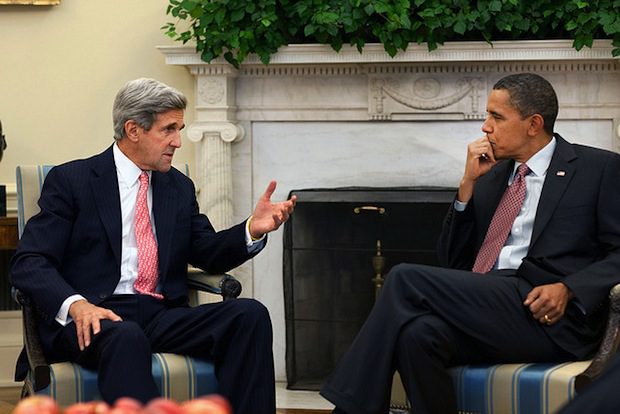Iran Hawks Still Want to Sabotage a Nuclear Deal

Politico reports on the latest Senate Republican maneuvers to attempt to wreck a nuclear deal with Iran. This detail stood out:
In a private conversation this spring, Corker told Secretary of State John Kerry he can define his legacy by walking away from a “bad deal.” [bold mine-DL]
If Obama and Kerry now backed out of the negotiations, that would definitely define their “legacy” on foreign policy, but not in the way Corker means. Walking away from the Iran talks now would define Kerry as a failure as Secretary of State, and it would be the most absurd and embarrassing capitulation to hard-liners that Obama has yet made. It’s difficult to take Corker’s warnings seriously when critics of the negotiations are intent on defining any deal that can actually be reached as a “bad deal.” Meanwhile, Corker’s own legislation has made it more likely that Obama will agree to terms that are even less satisfactory to hawkish critics. According to the Corker-Cardin legislation, Congress will have at least 30 days to review the deal if it is presented to them before the 10th of next month, but after that Congress will get 60 days to review it. Fred Kaplan explains:
Congress put this extension in the law to put pressure on Obama to get a deal that its critics might find more palatable, but in fact, it may have the opposite effect. To the extent Obama feels pressured at all, this bill might push him to take a fast deal—to wrap things up if not by Tuesday, then at least before July 10, so that the deal’s critics have only 30 days, not 60, to rally the votes against it. Certainly the Iranians realize this; as a result, they may put off their final concessions, thinking that Obama has a greater incentive to rush. In other words, in their power grab, the congressional critics have, if anything, removed some of the American negotiators’ leverage in the talks. If the critics truly fear that Obama might agree to a less-than-good deal, they have pushed him to do so.
Every time that there has been a “deadline” for each stage of the negotiations, the U.S. has been the only one put under pressure by the “deadline.” Each time the negotiations have gone past the official “deadline,” and Iran has had more leverage as a result because U.S. negotiators have had to cope with interference from Congress throughout the process. Everything that hawks in Congress have done in the name of supposedly pressuring Obama to strike a better deal has worked to the benefit of the Iranians, and the unnecessary Corker-Cardin legislation is just the latest example of this. Iran hawks want to kill the deal entirely, but since they haven’t been able to do that their interference will probably just end up producing a relatively weaker deal than if they hadn’t tried to meddle in the process at all. Unsurprisingly, the people most alarmed about “empowering” Iran have been strengthening Iran’s hand in the negotiations for months.
The Politico article continues:
Still, a resolution of approval that barely registered 40 votes in the Senate would broadcast to critics across the globe that the American public disapproves of the deal — not the message the White House wants to send.
I’m sure that’s what hawkish opponents of the deal want the world to think, but it isn’t true. Every credible survey of American public opinion on the deal shows that the public is broadly supportive of the negotiations, and when they are presented with the outline of a likely deal there is likewise broad support for that. Congress is completely out of step and at odds with the public on this issue. The more important point is that there aren’t going to be enough votes to kill the deal, which means that our wildly unrepresentative “representatives” won’t be able to block a deal that the public supports.
Comments